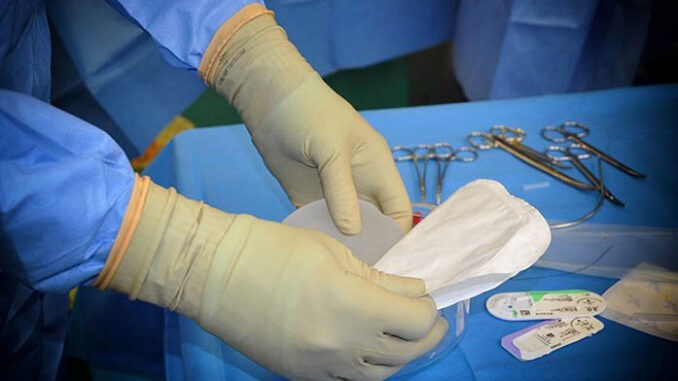
WASHINGTON – No one disputes that Nicole Weber was injured – including losing some of her eyesight – by a leaking breast implant, but a federal appeals court ruled Friday that federal law protects the manufacturer from the Arizona woman’s lawsuit.
A three-judge panel of the 9th U.S. Circuit Court of Appeals said it was “sympathetic to Weber’s health problems,” but upheld a lower court ruling that she failed to prove that the manufacturer, Allergan, breached any Food and Drug Administration requirements that would make it liable.
Attorneys for the implant manufacturer did not immediately return a phone call seeking comment on the ruling Friday. But Weber’s lawyer said the decision will make it even harder for injured women to get compensation.
“The court’s decision essentially was, ‘You have to tell us what happened in the manufacturing process that caused the product not to meet the specifications,’” said Alan C. Milstein, an attorney with Sherman, Silverstein, Kohl, Rose & Podolsky. “I think that’s a pretty stiff burden, particularly for these implants.
“Presently, there’s so many women who have suffered,” he said.
Weber, a Gold Canyon resident, was diagnosed in 2009 with breast cancer and underwent a double mastectomy later that year. After that, she got the implants.
Shortly after her reconstructive surgery, she began experiencing tightness and discomfort with the implants, according to her original complaint. A doctor reassured Weber that she was all right, but the list of her symptoms steadily grew: “daily migraines; severe lung and breathing difficulties; severe anxiety; tinnitus; severe vertigo; racing heartbeat” and other ailments, the lawsuit said.
She visited the emergency room several times, as well as different physicians for her sudden eyesight troubles.
Almost two years later, another doctor tied Weber’s health problems to the implants. When the doctor removed the implants, she found that one had been leaking silicone gel, about 2.8% of which had trickled into Weber’s body.
Although she eventually recovered from some ailments, her lawsuit said she might lose her vision forever after developing autoimmune retinopathy, a rare disease that targets the retina.
“Ms. Weber was a healthy individual and lived a healthy lifestyle,” the suit said. “She organized and played in an employer-sponsored soccer league in 2007 and 2008.”
Weber filed suit against Allergan in 2012, amending it in 2016 to claim product liability and corporate negligence.
In January 2018, a U.S. district judge in Phoenix ruled in favor of Allergan, saying the pertinent issue was not if Weber received a malfunctioning product, but whether the company violated the FDA-approved process for manufacturing the implants. The court also ruled that federal law pre-empted any state law.
“It was never decided based on actually the damage done to this woman, and that’s really unfortunate,” said Adam Garber, consumer watchdog at the U.S. Public Interest Research Group. “It would be much better if the states could have the authority to further protect their citizens from a whole host of dangers, including problems with medical devices.”
Weber appealed, but the 9th Circuit panel agreed with the lower court. It rejected her claim that Allergan should be held to product labeling that referenced a “bleed rate of less than 1%,” which the company said was an “extremely low level … of no clinical consequence.”
The opinion by Circuit Judge John B. Owens said it was not enough for Weber’s doctor to give her opinion on the severity of the leak. She had to show that Allergan did not adhere to the FDA’s Current Good Manufacturing Practices for medical devices.
“We are sympathetic to Weber’s health problems,” Owens wrote. “However, she has not shown a violation of an FDA requirement.”
Garber called the case a lesson for others on the safety of medical devices – and better protection of patients.
“The state should be able to go even further in ensuring that consumers’ rights can be exercised to go after companies if they’re damaged by these sort of products,” he said.
